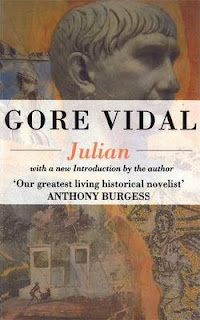Vidal's Julian is
an epic historical novel, capturing the short reign of this popular
Roman emperor, who, with good intentions in the 2nd
century, attempted to bring back Hellenism, in the face of the new,
violent and pervasive religion, Christianity. It was his uncle,
Constantine I, that established Christianity as a State religion. A
highly educated man of philosophy, Christianity, and the ancient
Mystery Schools, Julian did not desire to destroy the new religious
movement, but to bring back the old “pagan” beliefs, to restore
Rome back to its former glory. If he would have survived his invasion
of Persia, many scholars believe that Christianity might not have
attained the success it did under Roman sponsorship and rule.
The
historical novel has never been my “go to” source for
understanding the past. Vidal made it a cottage industry, however,
for his narratives of the American Empire began with the novel. Burr,
followed
by his most popular, Lincoln.
In all, he published six of the empire narratives, ending with my
personal favourite, Washington
D.C..
Julian
was
researched and written entirely in Rome, taking just under five years
to complete the project. In my readings of Vidal, he never clarified
why, as a novelist, he chose this particular subject matter. Julian
is a popular Roman emperor for classical historians, and perhaps
known and respected in very small circles, but he is not the “stuff
of popular culture”. That said, Julian
was
on The New York Best Seller list for months, gaining the acclaim of
mainstream critics, as well as many academics. This is a highly
educational and entertaining read.
Over
the past 3-4 years, I have been researching and writing about the
rise of Christianity, with the idea in the back of my mind, that the
early movement went astray. More to the point, my thesis is, that,
the Catholic Church, through the teachings of Saint Paul, as many
theologians regard as the First Heretic, moved against the original
teaching of the Nazarene, creating a whole new religion. Vidal's
novel covers, more or less, a similar path of research. Julian fought
against the hypocrisy of the first Church Fathers, arguing that their
borrowing from the Mystery Schools, which include history and ritual,
has nothing to do with the original teachings. Because Saint Paul
needed to”sell” this new religion to the masses, cut and pasted
from the popular Roman religions, including a strong hate for
Judaism. The novel never mentions this ideological siege against the
Jews in the later development of the religion. At the end of the
novel, one of the famous Church Fathers makes an appearance: John
Chrysostom. An influential Christian zeolite, who was infamously
antisemitic.
The
novel is structured as if the reader is a researcher of the time. We
read the letters between two philosophy teachers, Priscus and
Libanius. Both men are now quite old, worrying that Christian spies
are in ever corner, ready to turn them in for writing or speaking
against the Church. Both men taught Julian, while in his youth,
during his short time in Athens. Priscus was a close friend during
Julian's time of the Persia campaign; the campaign where the emperor
met his suspicious death.
When
one reads academic history about Julian, his death is most often
referred to as “suspicious”. Vidal makes a call, and reveals the
mystery of the man's death. From my readings, his conclusion is
logical and, as it is a novel, quite dramatic, and in a way,
desperately sad.
To
gain some insight into the time period, a time where Christianity
became a social force; understanding the arguments and views of the
period; arriving at a new comprehension of a compassionate,
sensitive, and intelligent Roman emperor, there is no better
historical novel than Julian.





No comments:
Post a Comment